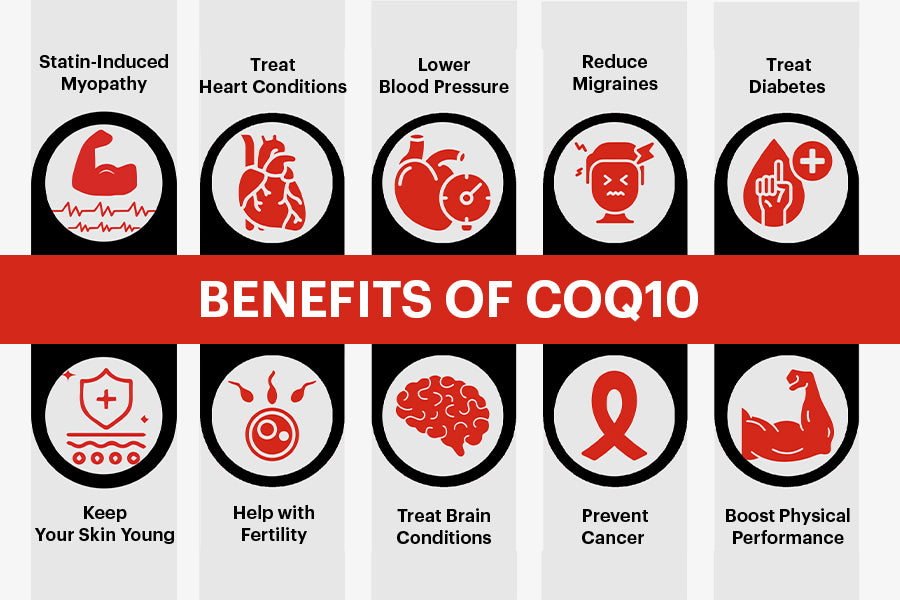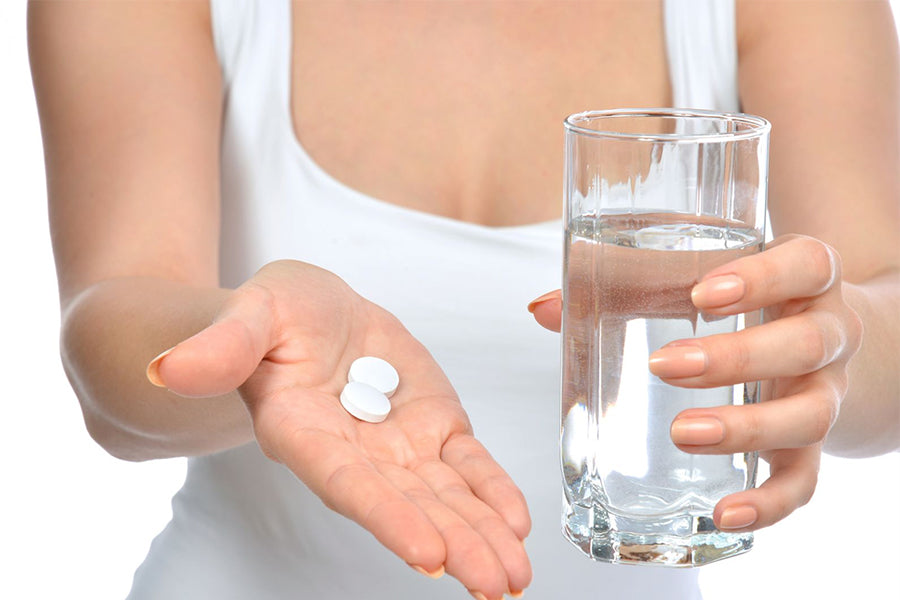Coenzyme Q10 is an important compound produced in your body and stored in mitochondria. It plays an essential role in providing energy to your cells and protecting them from damage caused by free radicals.
It also ensures heart health by decreasing blood pressure, protecting against heart diseases, and preventing heart failure. However, Coenzyme Q10 decreases as you age, and its deficiency may result in adverse effects.
While organ meat and fatty fish are excellent food sources of Coenzyme Q10, your body may not be able to meet the CoQ10 requirement by relying on foods only. Therefore, many people consume supplements to boost the production of CoQ10 in their bodies.
In this article, we will discuss the scientifically proven benefits of CoQ10, the food sources that boost its production in your body, and the role of supplementation. But before moving on to the benefits, you need to know a little more about CoQ10.
What is CoQ10?

CoQ10 is primarily responsible for making adenosine triphosphate (ATP), which helps transfer energy to your cells. ATP is a chemical that facilitates your body in essential functions, such as muscle contraction.
While CoQ10 is present in every cell within your body, its highest concentrations are mainly found in organs that need the most energy, such as the kidneys, lungs, liver, and heart.
The decreased levels of CoQ10 have severe health repercussions. The oxidative damage caused by an excessive quantity of free radicals impacts cell functioning and causes severe heart conditions. Therefore, some chronic diseases are considered a result of lower CoQ10 levels in your body.
Most older people experience CoQ10 deficiency. Some of the major reasons for CoQ10 deficiency include nutritional, especially vitamin B6 deficiency, genetic defects in CoQ10 utilization, oxidative stress caused by aging, and mitochondrial diseases.
However, ensuring proper concentration of CoQ10 is crucial for ensuring multiple health benefits, as highlighted in the next section.
Benefits of CoQ10

From ensuring heart health to preventing diseases, CoQ10 provides immense benefits to your body. Some of these benefits are discussed below:
May Lower Blood Pressure
High blood pressure or hypertension is among the common causes of heart diseases. CoQ10 helps boost heart health and prevents heart risks and diseases by maintaining blood pressure, especially among hypertensive patients.
According to a research study, CoQ10 lowered systolic blood pressure by 17mm Hg, the indicator of heart disease, and diastolic blood pressure by 11mm Hg.
May Treat Heart Conditions and Heart Failure
Severe medical conditions, such as coronary artery disease or hypertension, can result in heart failure. It could also cause inflammation of veins and arteries and can result in increased oxidative damage. When these damages impact the heart to the extent that it cannot contract, relax, or provide blood to the body, it can result in heart failure.
Some treatments for heart conditions may even have serious side effects, such as lower blood pressure and even reduced levels of CoQ10. On the other hand, treating heart conditions with CoQ10 can minimize oxidative damage, improve heart conditions, and restore energy production levels, all of which can help prevent heart failure.
A study on 420 patients suggested that treating heart disease with CoQ10 reduced risks for heart failure. Another study helped treat 641 patients through CoQ10 for a year. The study concluded that those treated with CoQ10 were hospitalized less frequently due to serious heart conditions.
Could Reduce Migraines and Headaches
Increased production of free radicals can result in lower energy to the brain cells and cause migraines. CoQ10 is stored in mitochondrial cells and is known for improving mitochondrial functions, such as reducing inflammation that causes migraines.
According to a research study, CoQ10 supplements were three times more effective in reducing migraines among 42 people. It has also been observed that migraine patients suffer from CoQ10 deficiency.
Another study including 1,550 individuals suggested that treatment with CoQ10 resulted in reduced and less severe headaches. Therefore, CoQ10 does not only help in treating migraines but also in preventing them.
May Help with Statin-Induced Myopathy
People at high risks for cardiovascular diseases are usually prescribed statins, a drug that lowers cholesterol. Statins also help lower blood lipids but have side effects. One of the most common and serious side effects of statin drugs is myopathy, a health condition in which muscle fibers fail to work properly. As a result, the patient experiences fatigue, muscle pain, and weakness.
However, a meta-analysis suggested that CoQ10 may help overcome this side effect. Those suffering from statin-induced myopathy when given the CoQ10 supplement experienced fewer symptoms.
May Treat Brain Conditions
As mitochondrial functions decrease with age, in some cases, it could result in total mitochondrial dysfunctions, which causes diseases like Parkinson’s and Alzheimer’s. As the brain is more susceptible to oxidative damage due to the high oxygen demand, oxidative damage can affect memory and cognition.
However, CoQ10 may help reduce the harmful compounds produced by oxidative damage, thereby slowing the progression of Parkinson’s and Alzheimer’s.
Could Help with Fertility
It is a known fact that female fertility decreases with age due to the number of eggs. In the same way, male sperm can also get affected due to oxidative damage.
However, research suggests that supplementing with CoQ10 may help overcome the age-related decline in eggs and sperm quality.
May Help Treat Diabetes
The cell damage caused due to oxidative stress can result in metabolic diseases like diabetes. However, CoQ10 plays an essential role in regulating blood sugar levels and enhancing insulin sensitivity in your body.
Research suggests that supplementing with CoQ10 may help increase CoQ10 concentrations three times, especially in people with diabetes who usually have reduced levels of this antioxidant.
According to a study, type 2 diabetes patients, when supplemented with CoQ10 for 12 weeks, experienced lowered fasting blood sugar levels and hemoglobin A1C.
May Help Keep Your Skin Young
Your skin is exposed to damaging factors such as hormonal imbalances or cellular damage that speed up aging. These harmful compounds can result in reduced skin moisture and thinning of the skin layer.
You can reduce the damage caused to your skin from the internal and external agents by directly applying CoQ10 to your skin, which has been shown to minimize the damage caused by UV rays significantly. Besides, research suggests that those with lower CoQ10 levels are more at risk of developing skin cancer.
May Help Prevent Cancer
The structure of your cells can get severely damaged when your body fails to fight oxidative damage, increasing the risk of cancer as a result.
CoQ10 may promote cellular energy production and ensure their protection by protecting your cells from oxidative stress. Cancer patients have been found to have lower levels of CoQ10.
According to a study, individuals with low levels of CoQ10 are at 53.3% more risk of contracting cancer. Another study suggests that supplementing with CoQ10 may help minimize the chance of cancer recurrence.
Boost Endurance and Physical Performance
Oxidative stress can also impact muscle functions, and therefore, your physical and exercise performance. In addition, compromised mitochondrial functions can also result in reduced muscle energy, making it difficult for the muscles to contract and sustain exercise pressure.
However, according to a study, CoQ10 can help enhance your exercise performance by reducing oxidative stress and facilitating mitochondrial functions.
A study examining the effects of CoQ10 on physical performance found that supplementing 1,200 mg of CoQ10 every day for two months could result in reduced oxidative stress.
Besides, CoQ10 supplementation can also improve your exercise performance by enhancing your power during exercise and minimizing fatigue.
The several health benefits of CoQ10 suggest that the compound must be present in adequate amounts in your body; therefore, the next section refers to the food sources that can boost the production of the CoQ10 compound.
Food Sources of CoQ10

You can obtain CoQ10 by consuming certain meat and grain proteins as listed below:
- Organ meats, such as heart, kidney, and liver.
- Muscle meats, like pork, chicken, and beef.
- Legumes, such as soybeans, peanuts, and lentils.
- Fatty fish such as Sardine, Salmon, and Trout.
- Fruits like oranges and strawberries.
- Vegetable, preferably broccoli, cauliflower, and spinach.
- Nuts and seeds, like pistachio and sesame seeds.
However, as the quantity required to increase CoQ10 is quite low in these foods, it is best to consume supplements containing enough nutrients to supply CoQ10 to your body. The role of supplements in boosting CoQ10 production in your body is discussed in the next section.
How Can Supplements Containing CoQ10 Help?

CoQ10 supplements are widely available in capsules or tablets and are commonly consumed by many people. Supplements are the easiest way to boost the daily production of CoQ10 in your body as it helps it stay steady.
A daily dose of CoQ10 ranging from 50 milligrams (mg) to 100 milligrams (mg) is recommended for maintaining an adequate amount of CoQ10 in the body. However, a daily dosage for those suffering from CoQ10 deficiency is between 100 mg to 200mg, while the dosage up to1,200 mg per day is generally considered safe.
The best CoQ10 supplements contain 50 milligrams of CoQ10, ideal for maintaining an adequate amount of CoQ10 levels in your body.
DMoose multivitamins contain 50 milligrams of CoQ10 and other essential nutrients, vitamins, herbal extracts, and minerals that promote mitochondrial health and boost physical endurance. The multivitamin contains a perfect blend of ingredients that support and boosts your immune system to overcome the impact of free radicals, oxidative stress, and other factors.
Besides, the vitamin pills ensure efficient cellular oxygen consumption and cardiovascular endurance. The multivitamin tablets also help reduce stress, fight fatigue, and enhance your productivity levels.
The 50 milligrams of CoQ10 in the multivitamins are perfect for ensuring heart health, promoting cellular health, and enhancing cognitive functions to make you feel energized and healthy all day.
Side Effects of CoQ10 Supplements
While the side effects of CoQ10 supplements are quite minor, you must be aware of them before taking the supplements.
The supplements containing CoQ10 can cause mild side effects, such as digestive problems, headaches, dizziness, fatigue, irritability, rash, insomnia, or light sensitivity.
Takeaway
Coenzyme (CoQ10) is an antioxidant present in all cells of the human body. However, the CoQ10 levels in your body tend to decline as you age, resulting in severe medical conditions, especially heart diseases.
It is crucial to maintain a healthy level of CoQ10 in the body due to the numerous benefits, such as maintaining blood pressure, helping treat heart and brain diseases, and boosting endurance and physical performance.
While CoQ10 can be consumed through different foods like organ meat, muscle meat, fatty fish, legumes, vegetables, and fruits, supplementation is considered an effective way to boost its production in the body. Supplements containing at least 50 mg of CoQ10 can help maintain adequate CoQ10 levels in the body.
Article Sources
- Cassarino, D. S., and J. P. Bennett. “An Evaluation of the Role of Mitochondria in Neurodegenerative Diseases: Mitochondrial Mutations and Oxidative Pathology, Protective Nuclear Responses, and Cell Death in Neurodegeneration.” Brain Research. Brain Research Reviews, vol. 29, no. 1, Jan. 1999, pp. 1–25. PubMed, https://doi.org/10.1016/s0165-0173(98)00046-0.
- Cooney, Robert V., et al. “Low Plasma Coenzyme Q (10) Levels and Breast Cancer Risk in Chinese Women.” Cancer Epidemiology, Biomarkers & Prevention: A Publication of the American Association for Cancer Research, Cosponsored by the American Society of Preventive Oncology, vol. 20, no. 6, June 2011, pp. 1124–30. PubMed, https://doi.org/10.1158/1055-9965.EPI-10-1261.
- DiNicolantonio, James J., et al. “Coenzyme Q10 for the Treatment of Heart Failure: A Review of the Literature.” Open heart, vol. 2, no. 1, 2015, p. e000326. PubMed, https://doi.org/10.1136/openhrt-2015-000326.
- El-ghoroury, Eman A., et al. “Malondialdehyde and Coenzyme Q10 in Platelets and Serum in Type 2 Diabetes Mellitus: Correlation with Glycemic Control.” Blood Coagulation & Fibrinolysis: An International Journal in Haemostasis and Thrombosis, vol. 20, no. 4, June 2009, pp. 248–51. PubMed, https://doi.org/10.1097/mbc.0b013e3283254549.
- Farage, Miranda A., et al. “Characteristics of the Aging Skin.” Advances in Wound Care, vol. 2, no. 1, Feb. 2013, pp. 5–10. PubMed, https://doi.org/10.1089/wound.2011.0356.
- Garrido-Maraver, Juan, et al. “Coenzyme Q10 Therapy.” Molecular Syndromology, vol. 5, no. 3–4, July 2014, pp. 187–97. PubMed, https://doi.org/10.1159/000360101.
- ---. “Coenzyme Q10 Therapy.” Molecular Syndromology, vol. 5, no. 3–4, July 2014, pp. 187–97. PubMed, https://doi.org/10.1159/000360101.
- Glover, Elisa I., et al. “A Randomized Trial of Coenzyme Q10 in Mitochondrial Disorders.” Muscle & Nerve, vol. 42, no. 5, Nov. 2010, pp. 739–48. PubMed, https://doi.org/10.1002/mus.21758.
- Gökbel, Hakk, et al. "The Effects of Coenzyme Q10 Supplementation on Performance During Repeated Bouts of Supramaximal Exercise in Sedentary Men." Journal of Strength and Conditioning Research, vol. 24, no. 1, Jan. 2010, pp. 97–102. PubMed, https://doi.org/10.1519/JSC.0b013e3181a61a50.
- Gül, I., et al. “Oxidative Stress and Antioxidant Defense in Plasma after Repeated Bouts of Supramaximal Exercise: The Effect of Coenzyme Q10.” The Journal of Sports Medicine and Physical Fitness, vol. 51, no. 2, June 2011, pp. 305–12.
- Hershey, Andrew D., et al. “Coenzyme Q10 Deficiency and Response to Supplementation in Pediatric and Adolescent Migraine.” Headache, vol. 47, no. 1, Jan. 2007, pp. 73–80. PubMed, https://doi.org/10.1111/j.1526-4610.2007.00652.x.
- Hoppe, U., et al. “Coenzyme Q10, a Cutaneous Antioxidant and Energizer.” BioFactors (Oxford, England), vol. 9, no. 2–4, 1999, pp. 371–78. PubMed, https://doi.org/10.1002/biof.5520090238.
- Hyun, Dong-Hoon, et al. “The Plasma Membrane Redox System Is Impaired by Amyloid β-Peptide and in the Hippocampus and Cerebral Cortex of 3xTgAD Mice.” Experimental Neurology, vol. 225, no. 2, Oct. 2010, pp. 423–29. PubMed, https://doi.org/10.1016/j.expneurol.2010.07.020.
- Lafuente, Rafael, et al. “Coenzyme Q10 and Male Infertility: A Meta-Analysis.” Journal of Assisted Reproduction and Genetics, vol. 30, no. 9, Sept. 2013, pp. 1147–56. PubMed, https://doi.org/10.1007/s10815-013-0047-5.
- Mancuso, M., et al. “Fatigue and Exercise Intolerance in Mitochondrial Diseases. Literature Revision and Experience of the Italian Network of Mitochondrial Diseases.” Neuromuscular Disorders: NMD, vol. 22 Suppl 3, Dec. 2012, pp. S226-229. PubMed, https://doi.org/10.1016/j.nmd.2012.10.012.
- Morisco, C., et al. “Effect of Coenzyme Q10 Therapy in Patients with Congestive Heart Failure: A Long-Term Multicenter Randomized Study.” The Clinical Investigator, vol. 71, no. 8 Suppl, 1993, pp. S134-136. PubMed, https://doi.org/10.1007/BF00226854.
- Mortensen, Svend A., et al. “The Effect of Coenzyme Q10 on Morbidity and Mortality in Chronic Heart Failure: Results from Q-SYMBIO: A Randomized Double-Blind Trial.” JACC. Heart Failure, vol. 2, no. 6, Dec. 2014, pp. 641–49. PubMed, https://doi.org/10.1016/j.jchf.2014.06.008.
- Qu, Hua, et al. “Effects of Coenzyme Q10 on Statin-Induced Myopathy: An Updated Meta-Analysis of Randomized Controlled Trials.” Journal of the American Heart Association, vol. 7, no. 19, Oct. 2018, p. e009835. PubMed, https://doi.org/10.1161/JAHA.118.009835.
- Rosenfeldt, F. L., et al. “Coenzyme Q10 in the Treatment of Hypertension: A Meta-Analysis of the Clinical Trials.” Journal of Human Hypertension, vol. 21, no. 4, Apr. 2007, pp. 297–306. PubMed, https://doi.org/10.1038/sj.jhh.1002138.
- Rusciani, Luigi, Ilaria Proietti, Antonio Rusciani, et al. “Low Plasma Coenzyme Q10 Levels as an Independent Prognostic Factor for Melanoma Progression.” Journal of the American Academy of Dermatology, vol. 54, no. 2, Feb. 2006, pp. 234–41. PubMed, https://doi.org/10.1016/j.jaad.2005.08.031.
- Russian, Luigi, Ilaria Proietti, Andrea Paradisi, et al. “Recombinant Interferon Alpha-2b and Coenzyme Q10 as a Postsurgical Adjuvant Therapy for Melanoma: A 3-Year Trial with Recombinant Interferon-Alpha and 5-Year Follow-Up.” Melanoma Research, vol. 17, no. 3, June 2007, pp. 177–83. PubMed, https://doi.org/10.1097/CMR.0b013e32818867a0.
- Saini, Rajiv. “Coenzyme Q10: The Essential Nutrient.” Journal of Pharmacy & Bioallied Sciences, vol. 3, no. 3, July 2011, pp. 466–67. PubMed, https://doi.org/10.4103/0975-7406.84471.
- Sándor, P. S., et al. “Efficacy of Coenzyme Q10 in Migraine Prophylaxis: A Randomized Controlled Trial.” Neurology, vol. 64, no. 4, Feb. 2005, pp. 713–15. PubMed, https://doi.org/10.1212/01.WNL.0000151975.03598.ED.
- Shults, Clifford W., et al. “Effects of Coenzyme Q10 in Early Parkinson Disease: Evidence of Slowing of the Functional Decline.” Archives of Neurology, vol. 59, no. 10, Oct. 2002, pp. 1541–50. PubMed, https://doi.org/10.1001/archneur.59.10.1541.
- Zahedi, Hoda, et al. "Effects of CoQ10 Supplementation on Lipid Profiles and Glycemic Control in Patients with Type 2 Diabetes: A Randomized, Double-Blind, Placebo-Controlled Trial." Journal of Diabetes and Metabolic Disorders, vol. 13, 2014, p. 81. PubMed, https://doi.org/10.1186/s40200-014-0081-6.











